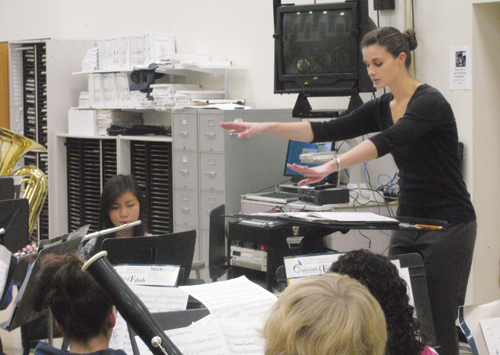
I remember my first year of teaching. Fresh out of college I was brimming with knowledge of music history, theory, and conducting patterns. I quickly found out that despite several years of experience constructing German sixth chords, there were many areas where I felt unprepared. Getting a handle on the 80% of the job outside of rehearsal was the biggest obstacle in my first year. From planning fundraisers to dealing with upset parents, the first year provided many unfamiliar tasks. In most cases finding the right approaches to these non-musical tasks took considerable experimentation over a few years.
Experimentation
Experimentation can be helpful when determining how to enforce expectations and standards for your ensembles. No two groups are the same, and it helps to approach each situation with that in mind. Although many inexperienced directors adopt the methods of their high school band director, these approaches may not always work in certain situations. You may want to look at the successful techniques used by colleagues at neighboring schools.
While a certain amount of experimentation is helpful, do not vary your methods wildly day to day as students will quickly become confused. If you take off points for students who talk out of turn on one day and on another, simply try to ignore the talking, you will likely make little progress at solving the problem. When you find methods that work well, stick with it for a while and reflect on its effectiveness. Staying consistent over time helps students know what to expect. It can take time for students to get used to your techniques and some may even resist at first.
It is important to remember that directors provide an important model for student conduct in class. If you expect students to sit up straight but you stand with a slouched posture, students may follow your example. A dozen different methods for teaching good posture will not matter if you do not stand up straight on the podium.
Seeking Help
If you do not know how to solve a problem, ask for advice. The early years of teaching can be overwhelming, and veteran directors have a wealth of experience that can be adapted to other schools. After five years of teaching I still email professors and mentors with questions, though less often than in the beginning. One of my favorite questions is “what pieces do you recommend for my band?” As someone who had only played in the top ensembles in high school and college, my knowledge of intermediate band music was initially lacking, to say the least. I asked several people the same question, described the band’s strengths and weaknesses, and ended up with a long list of great pieces customized for my band. This proved much more productive than spending hours sifting through music catalogs and repertoire lists. Certainly directors should do their own research, but getting advice from experienced directors helps focus that research and introduces great pieces that are unfamiliar.
Colleagues can also give assistance with such tasks as initiating a private lesson program or convincing the administration not to cut your budget. You need not follow their suggestions exactly, but listening to this wisdom can help you avoid making uneducated decisions that you may regret later.
Problems with Parents
Young directors frequently are surprised by contentious dealings with parents, administrators, and coaches. Even those who have great relationships with these people have to put out a fire from time to time. A freshman who generally does fine during regular rehearsals may be receiving a C in band after performing poorly on playing tests and failing to turn in assignments. When conference time rolls around, the parents maybe be angry because their child always earned As in junior high band. They might blame you for the grade and threaten to pull the student out of band to protect his GPA.
You can feel insulted that they blame you for the student’s actions or you can take a deep breath and calmly explain the grade. After telling parents that the student can retake playing tests before the end of the term and earn an A with regular practice six days a week, you may find that parents become allies and leave feeling good about the conference. Of course, not all disagreements with parents resolve calmly but in many cases when parents are upset, they do not have all the information.
Classroom Management
This topic generally comes up for a few days in music education courses, and I can even remember reading a book that discussed how to address various discipline problems. Once I started teaching, I found plenty of opportunities to develop my management skills. It helps to think about such small matters as how students enter the room, how much background noise you will tolerate during rehearsals, and what percussionists should do when not playing. The best classroom management allows the director to engage students so fully in the music that there is no time to mess around during rehearsal. Realistically, this doesn’t always happen.
Once you have developed rules and procedures that work for rehearsals, stick to the plan. While some students and situations will require different approaches, the consequences for misbehavior should be as consistent as possible. If you decide to lower a student’s grade for causing a classroom disruption, the number of points taken off might vary depending on the situation. Two oboists whispering quietly might produce a one point reduction while trumpets causing a major disruption in the back row could lead to taking off multiple points and calls to parents. The general goal of an orderly classroom remains the same. Some directors might decide that lowering grades by the same amount for any type of infraction works best.
New teachers will want to work with school administrators to determine the appropriate punishment in various scenarios. If a student talks back, you might decide to keep him after class for a conversation. When the problem persists, you might call home or send the student to the dean. These situations should be thought out in advance; you do not want to act rashly in the heat of the moment. Administrators can help set consequences that match up with school policy. Over time behavior problems may decline simply because students understand expectations for their behavior and the consequences for stepping out of line.
Looking in the Mirror
A common saying in music education is “If you are not getting the results you want, look in the mirror.” There is a great deal of truth to this, but not every problem can be averted by your actions in class. If all I had to do was say “Stop talking, please” my band would be perfect. A good result involves cooperation from all parties.
Let’s consider two scenarios. Students need to raise $200 for a weekend trip to an out-of-state contest. About half of the families in your program can pay the money without fundraising but others need help. If you get so busy with everything that you neglect to provide ample fundraising opportunities, it is your fault when only half of the band can make the trip. The poor morale that results from having incomplete instrumentation at the contest stems directly from your lack of effort.
The wiser approach is to plan fundraisers a year in advance and make sure that students who participate in the activities can attend the trip. The administration might cover some of the transportation costs and reduce the amount owed by every student to $175. When the contest arrives, only a few students miss the trip and the contest is a big success. Those who failed to fundraise, even after you called parents to explain how easy it would be, can only blame themselves for missing the trip.
You will drive yourself crazy if you blame yourself every time something goes wrong with your program. However, you have control over more than you think and your skill will grow day by day. The rewards that come from sharing your passion for music help overcome the occasional frustrations of discipline problems and endless school paperwork. One of the greatest moments of my teaching career happened when a parent told me her son came to school because of my class. At the end of the day he couldn’t stop talking about what he was doing in our classroom. These moments make it all worthwhile.






